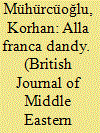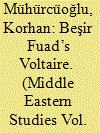| Srl | Item |
| 1 |
ID:
176558


|
|
|
|
|
| Summary/Abstract |
In the late 19th-century Ottoman novel, an iconic character draws attention: the alla franca dandy; a man who admires the Western culture to the point of mindless imitation, and who stands aloof from his own society as he condemns the Ottoman/Islamic culture in aesthetical terms. He was born out of the Ottoman intellectuals’ ideas of and anxiety over Westernization, who sought to modernize the society without subverting the traditional foundations. As the Ottoman/Islamic and Western cultures collided, the alla franca dandy figure became the embodiment of Westernization gone astray and served the intellectuals’ objective to educate the masses by setting a bad example to be avoided. However, though the alla franca dandy figure was brought forth, in this manner, to circumscribe the proper limits of modernization, he ironically evolved, through the novels of different authors, to express individualistic attitudes, and put forth a modernist critique of the Ottoman/Islamic tradition as the intellectuals’ epistemological assumptions eroded and the society’s present is questioned and problematized as in need of intervention.
|
|
|
|
|
|
|
|
|
|
|
|
|
|
|
|
| 2 |
ID:
187539


|
|
|
|
|
| Summary/Abstract |
Beşir Fuad (1852?-1887) is an obscure figure among late nineteenth century Ottoman intellectuals known for his materialistic views which were unprecedented under the Hamidian regime (1876-1909) and who shocked his contemporaries by committing suicide at an early age, leaving a note and a letter containing his last impressions and world view. Just months before his suicide, Beşir Fuad published a Voltaire biography in which he commemorates him as an Enlightenment ideal to be emulated in humankind’s struggle against religious intolerance. In this article, Beşir Fuad’s Voltaire (1886) is examined, arguing that the monograph was, though in an embryonic form, an early expression and defence of individual liberty, based on a materialistic world view that aims at demystification of the prevailing customs and morals as irrational and superstitious absurdities to pave the way for a future society in which the individual would be in liberty.
|
|
|
|
|
|
|
|
|
|
|
|
|
|
|
|